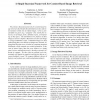Free Online Productivity Tools
i2Speak
i2Symbol
i2OCR
iTex2Img
iWeb2Print
iWeb2Shot
i2Type
iPdf2Split
iPdf2Merge
i2Bopomofo
i2Arabic
i2Style
i2Image
i2PDF
iLatex2Rtf
Sci2ools
129
click to vote
CVPR
2006
IEEE
2006
IEEE
A Simple Bayesian Framework for Content-Based Image Retrieval
We present a Bayesian framework for content-based image retrieval which models the distribution of color and texture features within sets of related images. Given a userspecified text query (e.g. "penguins") the system first extracts a set of images, from a labelled corpus, corresponding to that query. The distribution over features of these images is used to compute a Bayesian score for each image in a large unlabelled corpus. Unlabelled images are then ranked using this score and the top images are returned. Although the Bayesian score is based on computing marginal likelihoods, which integrate over model parameters, in the case of sparse binary data the score reduces to a single matrix-vector multiplication and is therefore extremely efficient to compute. We show that our method works surprisingly well despite its simplicity and the fact that no relevance feedback is used. We compare different choices of features, and evaluate our results using human subjects.
Bayesian Score | Computer Vision | Content-based Image Retrieval | CVPR 2006 | Large Unlabelled Corpus | Single Matrix-vector Multiplication | Unlabelled Images |
Related Content
| Added | 12 Oct 2009 |
| Updated | 12 Oct 2009 |
| Type | Conference |
| Year | 2006 |
| Where | CVPR |
| Authors | Katherine A. Heller, Zoubin Ghahramani |
Comments (0)

